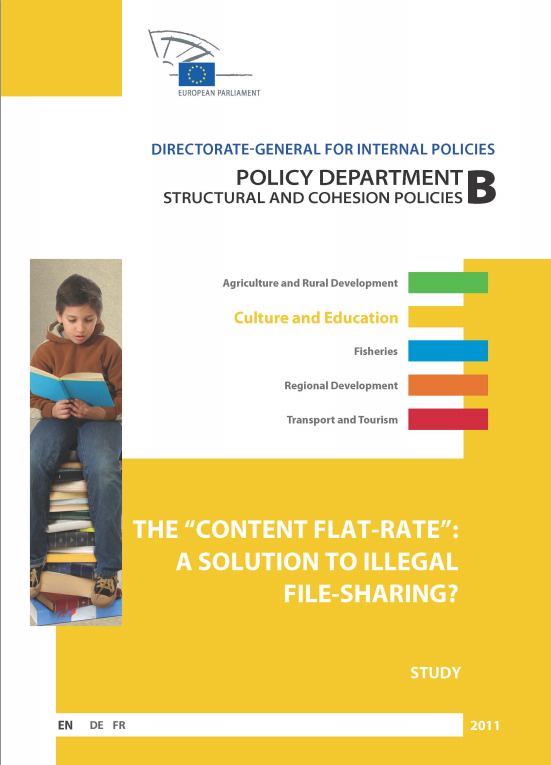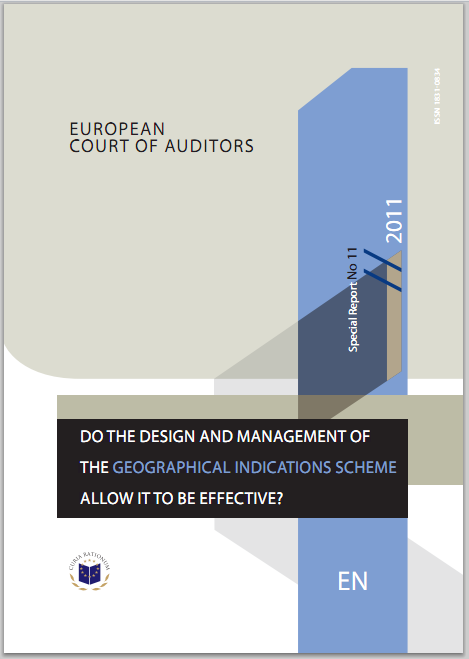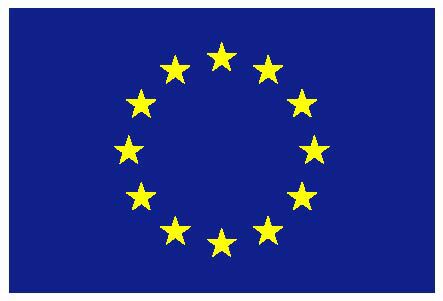European Parliament's Committee on Culture and Education, Study: The Content-Flatrate: A solution to illegal file-sharing, Conclusions and recommendations en The 42 Key factors of success for the feasibility of a content flat-rate, p. 103-109.

Auteursrecht. Piraterij. Vergoedingen. Collectief beheer in een Europese studie van 136 pagina's.
What must be taken into account concerning the content flat-rate scheme
It is necessary to provide protection for the end-user, based on facilitating a clear understanding of what acts are legally authorised and those which are not, and facilitate P2P and social networking, as long as those activities remain non-commercial and are not the subject of transactional agreements.
Extended collective licensing or exercise of rights should be promoted where opportunities exist for voluntary licensing and which are not (or cannot be) exploited by rights holders individually. This is intended to increase the legitimate market at the expense of piracy.
The content flat-rate system will be limited to download rights and some form of upload rights (making available) to allow access to P2P networks (where the protocol usually requires some form of uploading during downloading). The system will permit the global sharing of works of an end-user’s own digital collection, and will limit any form of sharing, over P2P networks, social sites, cyber lockers, etc., to a private circle of friends and family. As an example, the extended license of the making available right could be limited to 50 best friends, which means that P2P or DDL offerings (with new content offering) should only be allowed within one's social circle (perhaps via a social network).
The content flat-rate system will require that limitations are placed on the capacity of storage systems used within the authorised network and on the quantity of files shared irrespective of the protocols or applications used.
The ISP will have the capability to inform its subscribers when the quantity of files shared exceeds the authorised amount and then block excess sharing as they are already doing as part of current Internet and mobile phones subscription packages. The ISPs will be able to propose an extra fee in addition to the monthly content flat-rate if the consumer needs more capacity to exchange files as it works nowadays all over the world with Telecom operator’s cell phones subscriptions.
The limited, non-market status of the content flat-rate network should be enforced and the network ring-fenced from any commercial networks. There should be clear communication to potential end-users about the scope of activities which are permissible within the content flat-rate network. The terms should be standardised at European level and by category of work (and therefore not subject to a "single work single licensor" approach, or demarcated by territory of licensing or place of business of licensee and/or licensor)
 Europese Rekenkamer heeft in een 'audit' beoordeeld of de Commissie het Geografisch Indicatie-systeem beheert op een manier die het mogelijk maakt effectief te voldoen aan de doelstellingen. Drie criteria werden gebruikt voor de audit, namelijk de robuustheid van het gedefinieerde systeem, de aantrekkelijkheid van de regeling voor potentiële aanvragers en consumentenbewustzijn:
Europese Rekenkamer heeft in een 'audit' beoordeeld of de Commissie het Geografisch Indicatie-systeem beheert op een manier die het mogelijk maakt effectief te voldoen aan de doelstellingen. Drie criteria werden gebruikt voor de audit, namelijk de robuustheid van het gedefinieerde systeem, de aantrekkelijkheid van de regeling voor potentiële aanvragers en consumentenbewustzijn: Om te blijven volgen. Het eerste kamerstuk in het dossier evaluatie wet gratis schoolboeken. Minister van OCW:
Om te blijven volgen. Het eerste kamerstuk in het dossier evaluatie wet gratis schoolboeken. Minister van OCW:
 p. 12. Toetreding van de Europese Unie tot de conventie van de Raad van Europa over bescherming van audiovisuele diensten op basis van voorwaardelijke toegang – aannemen raadsbesluit
p. 12. Toetreding van de Europese Unie tot de conventie van de Raad van Europa over bescherming van audiovisuele diensten op basis van voorwaardelijke toegang – aannemen raadsbesluit In navolging van IEF
In navolging van IEF 

 De leden van de PvdA-fractie zijn van mening dat de publieke media-instellingen door de weinig voorstellende bepalingen over minimale rijksmediabijdrage veel te sterk een speelbal zijn van de politiek.
De leden van de PvdA-fractie zijn van mening dat de publieke media-instellingen door de weinig voorstellende bepalingen over minimale rijksmediabijdrage veel te sterk een speelbal zijn van de politiek. Correctie 11u19: het gaat om twee afzonderlijke incidenten
Correctie 11u19: het gaat om twee afzonderlijke incidenten Beschermde Geografische Aanduiding. Dit voorstel vervangt de huidige verordening (EEG) Nr. 1601/91 tot vaststelling van de algemene voorschriften betreffende de definitie, de aanduiding en de aanbiedingsvorm van gearomatiseerde wijnen, gearomatiseerde dranken op basis van wijn en gearomatiseerde cocktails van wijnbouwproducten. Hierbij valt onder meer te denken aan sangria, glühwein, vermout, bitter soda en maitrank.
Beschermde Geografische Aanduiding. Dit voorstel vervangt de huidige verordening (EEG) Nr. 1601/91 tot vaststelling van de algemene voorschriften betreffende de definitie, de aanduiding en de aanbiedingsvorm van gearomatiseerde wijnen, gearomatiseerde dranken op basis van wijn en gearomatiseerde cocktails van wijnbouwproducten. Hierbij valt onder meer te denken aan sangria, glühwein, vermout, bitter soda en maitrank.
























































































